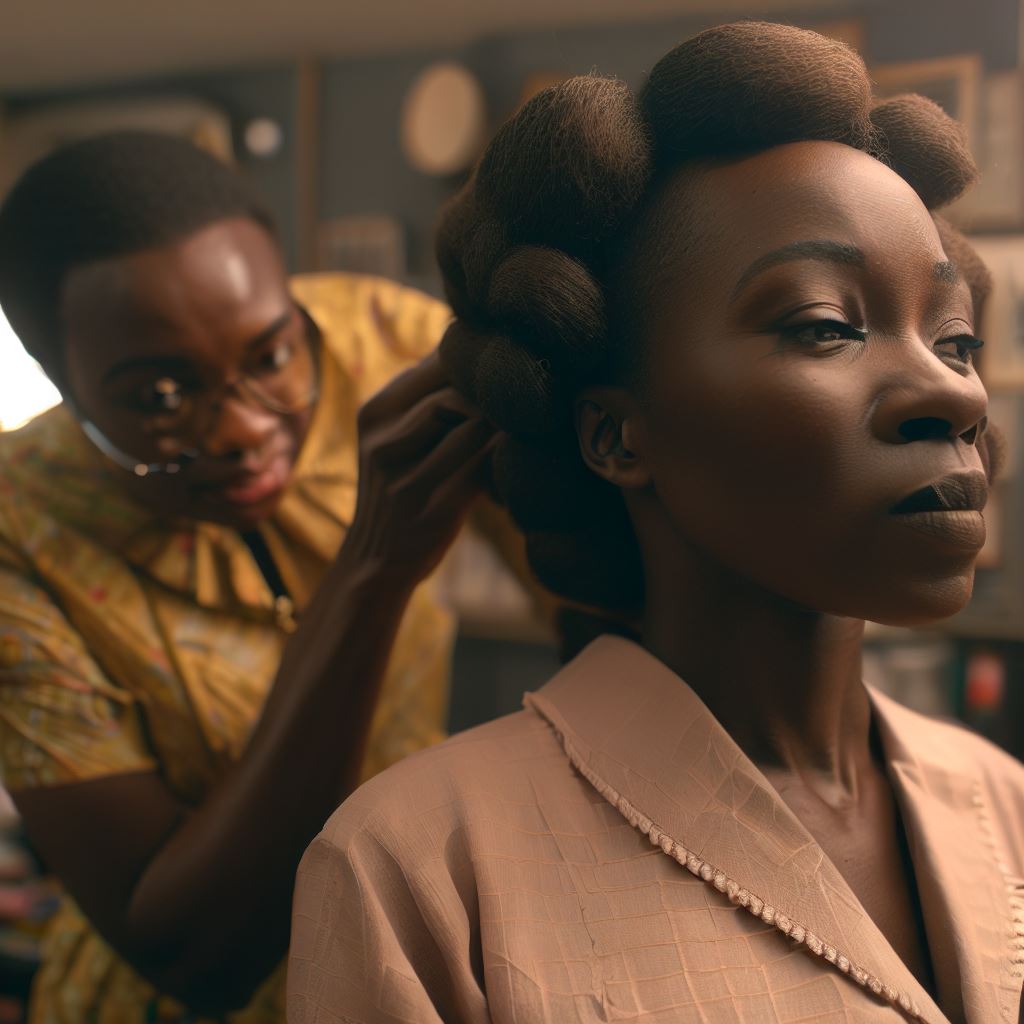Introduction
Film music in Nigeria holds significant cultural importance as it contributes to the rich heritage and storytelling traditions.
It provides a means of preserving and promoting cultural values and traditions.
Film music in Nigeria not only entertains but also serves as a medium for educating and enlightening the audience.
It also reflects the diverse cultural identities, languages, and traditions of the Nigerian people.
Film music in Nigeria plays a pivotal role in enhancing the emotional impact of film scenes and narratives.
Film music in Nigeria nurtures a sense of national identity and fosters unity among Nigerians.
Nigeria film music has evolved over the years, blending traditional Nigerian sounds with contemporary elements.
It has the power to transcend language and cultural barriers, reaching a wider global audience.
Nigeria film music acts as a form of cultural expression, showcasing the creative talents of Nigerian musicians.
It has found success internationally, contributing to the recognition and appreciation of Nigerian culture.
In short, film music in Nigeria enriches the Nigerian cultural landscape, amplifying the voices and stories of its people.
Historical Overview
A. Brief background on the history of Nigerian film industry (Nollywood)
The Nigerian film industry, also known as Nollywood, has a rich history that spans several decades.
It first emerged in the 1960s, with the release of the film “Palaver” in 1949 considered as the starting point of Nollywood.
However, it wasn’t until the 1990s that Nollywood experienced significant growth and became a major cultural force.
During this period, the Nigerian film industry faced several challenges, including limited funding and access to modern equipment.
Despite these obstacles, Nollywood filmmakers managed to create low-budget films that resonated with audiences both in Nigeria and across the African continent.
B. The emergence of film music in Nigeria
The emergence of film music in Nigeria can be traced back to the early days of Nollywood.
In the beginning, filmmakers relied mostly on pre-existing music tracks to accompany their films.
This music was usually sourced from popular Nigerian songs or traditional music styles.
C. The early influences and styles of film music in Nigeria
As the Nigerian film industry grew, there was an increasing demand for original film music.
This led to the rise of talented composers who started creating music specifically for Nollywood films.
These composers drew inspiration from a variety of musical styles, including traditional Nigerian music, Afrobeat, highlife, and juju.
D. Notable pioneers and composers in Nigerian film music
Notable pioneers and composers in Nigerian film music include Fela Sowande, who is often regarded as the father of Nigerian art music.
Sowande’s compositions blended Western classical music with Nigerian folk music, creating a unique sound that influenced future generations of Nigerian composers.
Another influential figure in Nigerian film music is Tony Allen, a drummer and composer known for his work with Fela Kuti and his pioneering Afrobeat sound.
Allen’s rhythmic and energetic compositions became popular in Nigerian cinema and showcased the fusion of traditional African music with modern influences.
In addition to these pioneers, there are many other composers who have made significant contributions to Nigerian film music.
Some notable names include Mike Ejiofor, who composed the popular soundtrack for the film “Living in Bondage,” and Sir Victor Uwaifo, a singer-songwriter who composed music for several Nollywood films.
Overall, the history of film music in Nigeria is deeply intertwined with the development of the Nigerian film industry itself.
From its early influences to the emergence of original compositions, Nigerian film music has played a vital role in enhancing the cultural significance of Nollywood and has become an integral part of the Nigerian cinematic experience.
Read: Behind the Scenes: Life of a Nigerian Film Composer
Role of Film Music in Nigerian Cinema
A. How film music enhances storytelling and emotions in Nigerian films
Film music plays a crucial role in enhancing storytelling and evoking emotions in Nigerian films.
It adds depth and richness to the cinematic experience, making it more immersive for the audience.
The soundtrack is carefully composed to complement the visuals and dialogue, creating a harmonious blend that heightens the overall impact of the film.
B. Importance of film music in creating a Nigerian identity
One of the primary functions of film music is to enhance storytelling.
It helps to convey the mood, atmosphere, and emotions of a scene, guiding the viewers’ interpretation of the narrative.
For instance, a haunting melody can evoke a sense of foreboding, while a triumphant orchestral score can amplify the hero’s journey.
Nigerian filmmakers utilize film music as a powerful tool to effectively communicate the story’s themes and create a lasting impact on the audience.
In addition to enhancing storytelling, film music also plays a vital role in creating a distinct Nigerian identity in cinema.
By incorporating indigenous musical elements into the soundtrack, filmmakers celebrate the rich cultural heritage of Nigeria.
Traditional Nigerian instruments such as the talking drum, shekere, and kalimba are often used to infuse authenticity and a sense of place into the films.
This integration of local music helps to establish a unique identity and fosters a deeper connection between the film and its Nigerian audience.
C. The use of traditional Nigerian music elements in film music
An analysis of Nigerian film music reveals the extensive use of traditional elements within the compositions.
Nigerian filmmakers recognize the importance of representing their country’s diverse musical traditions.
These elements can include rhythmic patterns, melodic structures, and indigenous vocal styles.
By incorporating these traditional elements, filmmakers not only preserve and promote Nigerian musical heritage but also enrich the cinematic experience by adding a distinctly Nigerian flavor.
D. The impact of film music in promoting Nigerian culture globally
Furthermore, film music in Nigeria has played a significant role in promoting Nigerian culture globally.
Nollywood, the Nigerian film industry, is the second-largest film industry in the world, and its popularity extends beyond the borders of Nigeria.
The infectious rhythms and melodies of Nigerian film music have captivated audiences worldwide, showcasing the richness and vibrancy of Nigerian culture.
Through film music, Nigeria has been able to increase its global visibility and influence, promoting a positive image of the country and its diverse cultural traditions.
To conclude, film music in Nigerian cinema plays a crucial role in enhancing storytelling, evoking emotions, and creating a distinct Nigerian identity.
It showcases the richness of Nigeria’s musical heritage and contributes to the promotion of Nigerian culture globally.
As the Nigerian film industry continues to grow and evolve, film music will remain an integral part of its success, captivating audiences both at home and abroad.
Read: How to Navigate Copyright as a Nigerian Composer

Social and Cultural Implications
A. How film music reflects and shapes Nigerian society
Film music plays a crucial role in reflecting and shaping Nigerian society.
It acts as a mirror, capturing the essence of the culture and translating it into an auditory experience.
B. The influence of film music on audience emotions and perceptions
The influence of film music on audience emotions and perceptions cannot be underestimated.
It has the power to evoke a wide range of emotions, from joy and excitement to sadness and fear.
C. The role of film music in reinforcing cultural values and traditions
In Nigeria, film music serves as a tool to reinforce cultural values and traditions.
It helps in preserving and promoting indigenous music styles and instruments.
Traditional rhythms and melodies are often incorporated into film scores, providing a sense of familiarity and identity to the audience.
This not only strengthens cultural pride but also encourages the younger generation to connect with their roots.
D. How film music can be used to challenge social issues and effect change
Furthermore, film music can be used as a vehicle to challenge social issues and effect change.
It has the ability to convey powerful messages that resonate with the viewers.
By addressing topics such as corruption, poverty, gender inequality, and political unrest, film music raises awareness and initiates conversations.
It acts as a catalyst for social change, urging individuals to question the status quo and take action.
E. How film music can influence public opinion and shape collective narrative
Apart from addressing social issues, film music also has the potential to influence public opinion and shape collective narratives.
It can shape the audience’s perception of historical events, political figures, and societal structures.
By using specific musical motifs and themes, composers can manipulate emotions and guide the audience’s interpretation of a film’s message.
This highlights the immense power of film music in shaping cultural narratives and shaping public discourse.
F. How film music can serve as cultural bridge
Film music also serves as a cultural bridge, fostering cross-cultural understanding and appreciation.
Nigerian movies and their soundtracks have gained popularity not only within the country but also internationally.
Through the use of fusion genres and collaborations with international artists, Nigerian film music has found its way onto global platforms, exposing foreign audiences to the richness and diversity of Nigerian culture.
This helps break stereotypes and builds a more nuanced understanding of Nigerian society.
Moreover, film music acts as an economic driver, creating opportunities for musicians and composers in Nigeria.
The demand for original soundtracks has led to the emergence of a thriving film music industry.
Musicians are now able to make a living by composing music for movies, expanding their creative horizons and contributing to the growth of the entertainment sector.
This provides a platform for Nigerian music to flourish and reach wider audiences.
In review, the cultural significance of film music in Nigeria cannot be overstated.
It reflects and shapes Nigerian society, influences audience emotions and perceptions, reinforces cultural values, challenges social issues, and contributes to cultural exchange and economic growth.
As Nigeria continues to develop its film industry, the role of film music will only become more prominent, further solidifying its importance in Nigerian culture and beyond.
Read: The Power of Music in Nigerian Film Narratives
Collaborations and Innovation
One of the key aspects of Nigerian film music is the collaborations between musicians and filmmakers.
These partnerships have enabled the creation of unique and compelling soundtracks that enhance the overall cinematic experience.
A. Collaborations between Nigerian musicians and filmmakers
Nigerian musicians have been actively involved in the film industry, working closely with filmmakers to compose music that complements the narrative and evokes the desired emotions.
This collaboration has resulted in the production of exceptional soundtracks that have become an integral part of Nigerian cinema.
B. The fusion of different music genres in Nigerian film music
The fusion of different music genres in Nigerian film music is another significant factor that adds to its cultural significance.
Publish Your Professional Profile, Business or Brand
Showcase your expertise, gain trust, and boost visibility instantly on Professions.ng.
Publish NowNigerian filmmakers often incorporate traditional Nigerian music such as Afrobeat, Highlife, Juju, and Fuji into their soundtracks.
This blending of traditional and contemporary music styles helps to create a distinct Nigerian sound that reflects the rich cultural heritage of the country.
It also adds depth and authenticity to the films, making them more relatable to Nigerian audiences.
C. The impact of technology on the production and distribution of film music in Nigeria
Technology has had a profound impact on the production and distribution of film music in Nigeria.
Advancements in recording and editing software have made it easier and more affordable for filmmakers to create high-quality soundtracks.
Furthermore, the internet and digital platforms have revolutionized the distribution of film music.
Musicians and filmmakers can now easily share their work online, reaching a wider audience and attracting international recognition.
D. Recent innovations or trends in Nigerian film music
In recent years, there have been several notable innovations and trends in Nigerian film music.
One such trend is the incorporation of popular Nigerian songs into film soundtracks.
By featuring well-known songs in films, filmmakers can attract a larger audience and capitalize on the popularity of these songs.
This cross-promotion between music and film industries has proven to be highly successful in Nigeria.
Another innovation is the use of live performances of film music during screenings.
This practice has gained popularity as it creates a more immersive movie-watching experience and allows audiences to connect with the music on a deeper level.
Furthermore, filmmakers are increasingly collaborating with international music producers and composers, bringing a fresh perspective to Nigerian film music.
These collaborations have resulted in the creation of innovative and globally appealing soundtracks.
Basically, the collaborations between Nigerian musicians and filmmakers, along with the fusion of different music genres, have played a crucial role in shaping the cultural significance of film music in Nigeria.
The impact of technology has also been significant, enabling easier production and distribution of soundtracks.
Lastly, recent innovations and trends such as incorporating popular songs and live performances have added a dynamic element to Nigerian film music.
These developments highlight the continuous evolution and innovation within the Nigerian film industry, making it an exciting space to explore.
Read: Film Composing: A Career with Global Impact
Conclusion
Film music plays a significant role in Nigerian culture, enhancing the storytelling and creating emotional connections with the audience.
Nigerian film music has the potential to continue growing and gain international recognition.
Its unique blend of traditional and contemporary elements makes it appealing to a global audience.
Despite the challenges faced by the industry, film music remains an essential part of Nigerian cinema and will continue to be for years to come.
Its enduring importance lies in its ability to transport viewers and evoke emotions, making it an integral aspect of Nigerian filmmaking.




